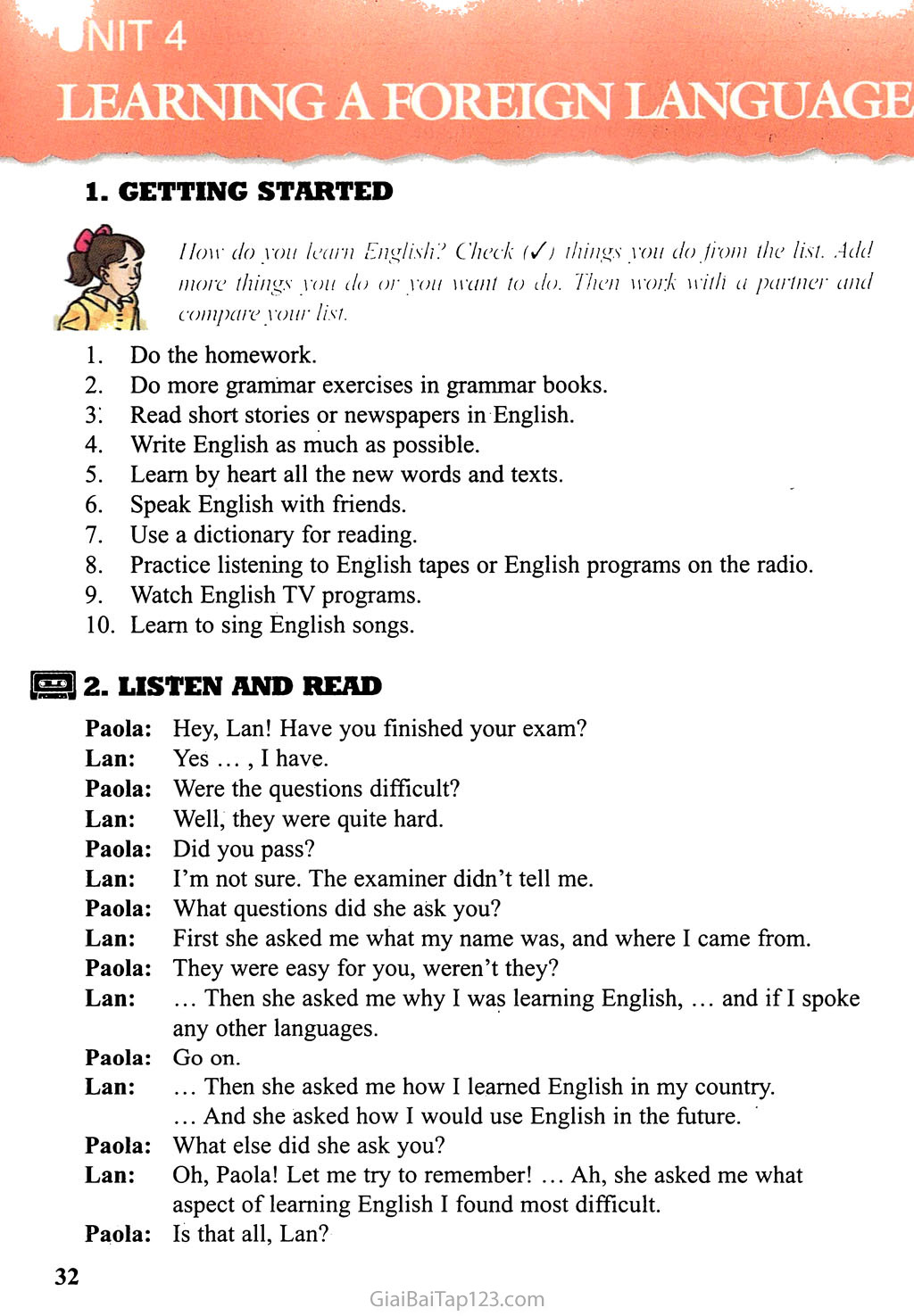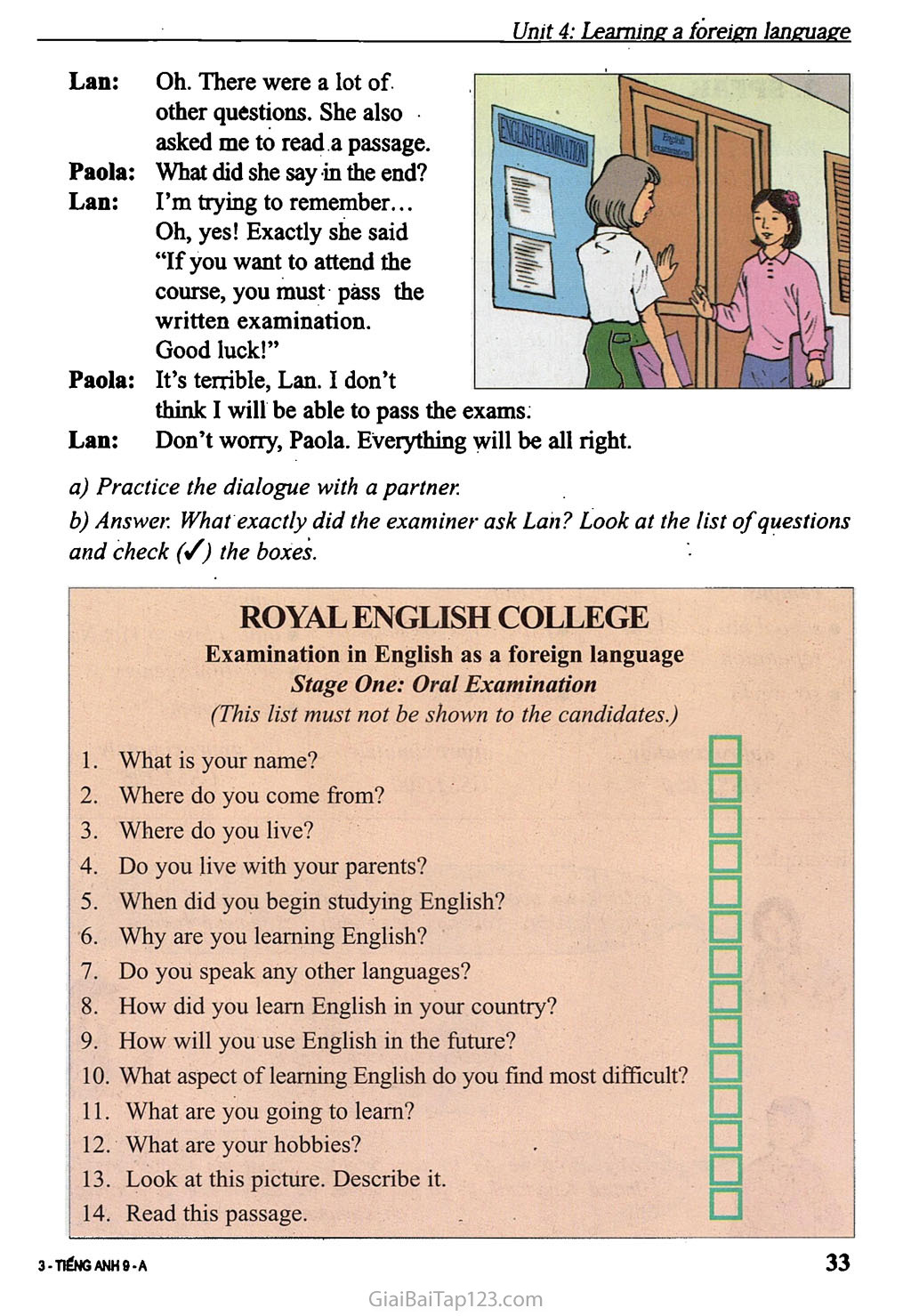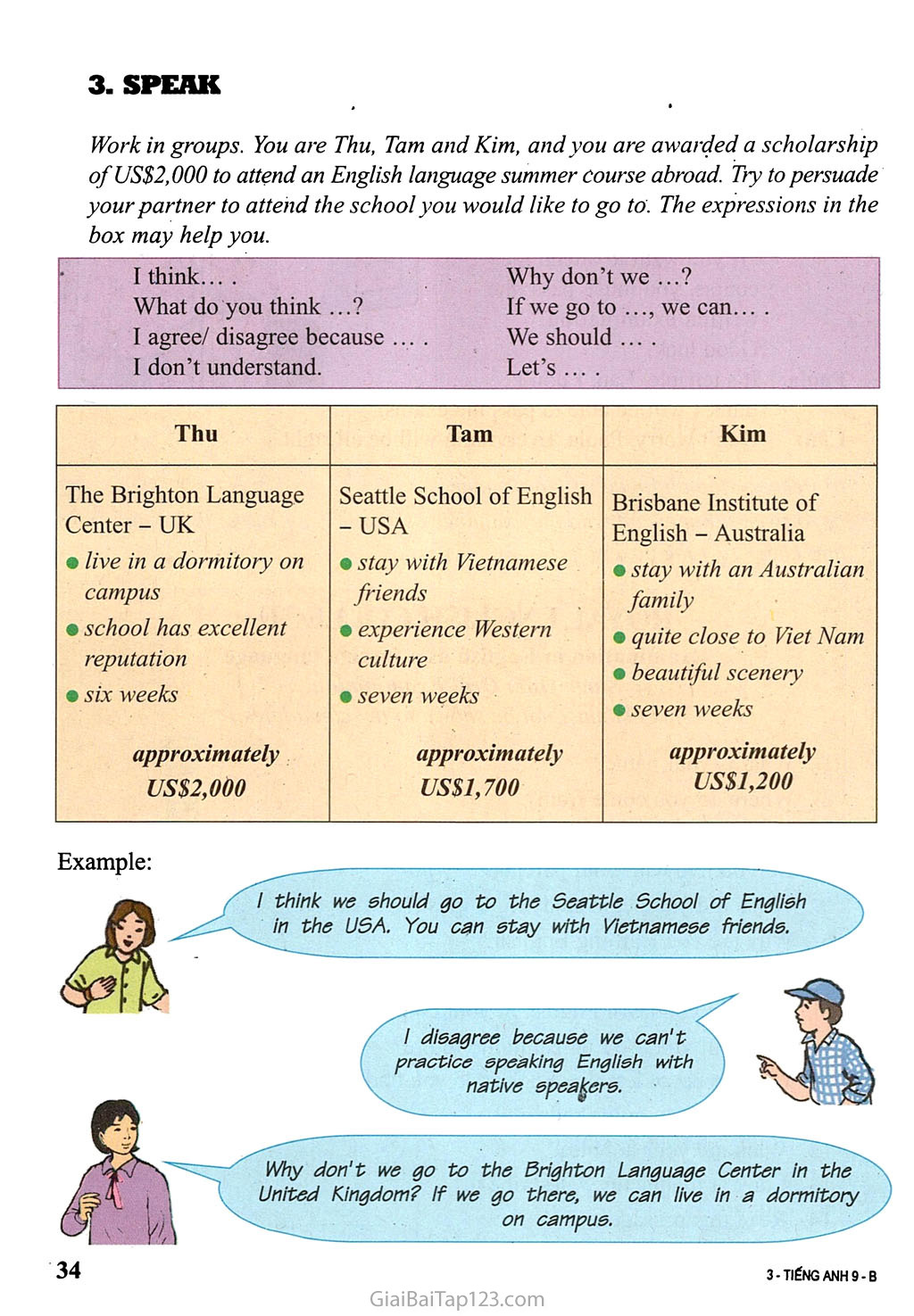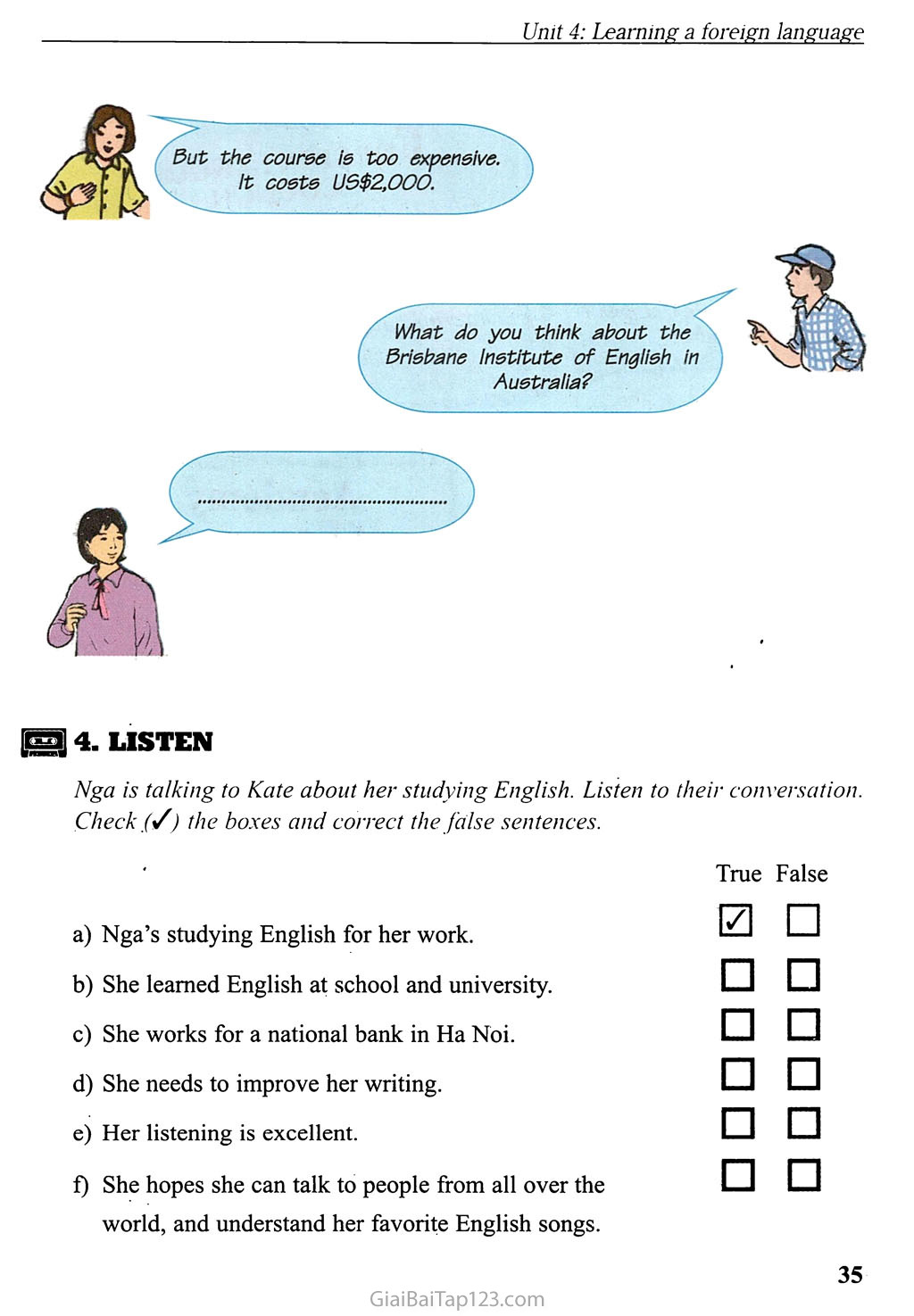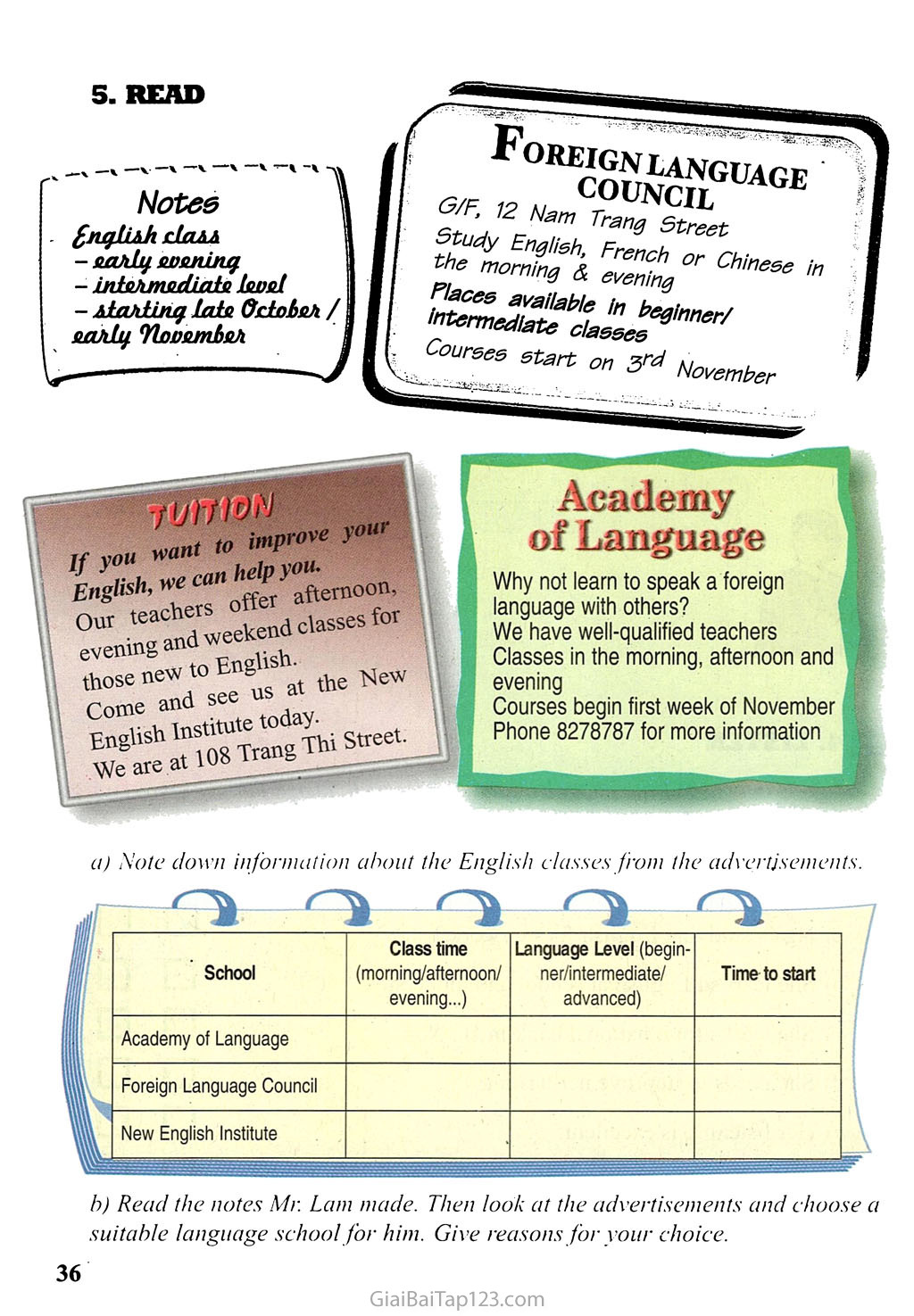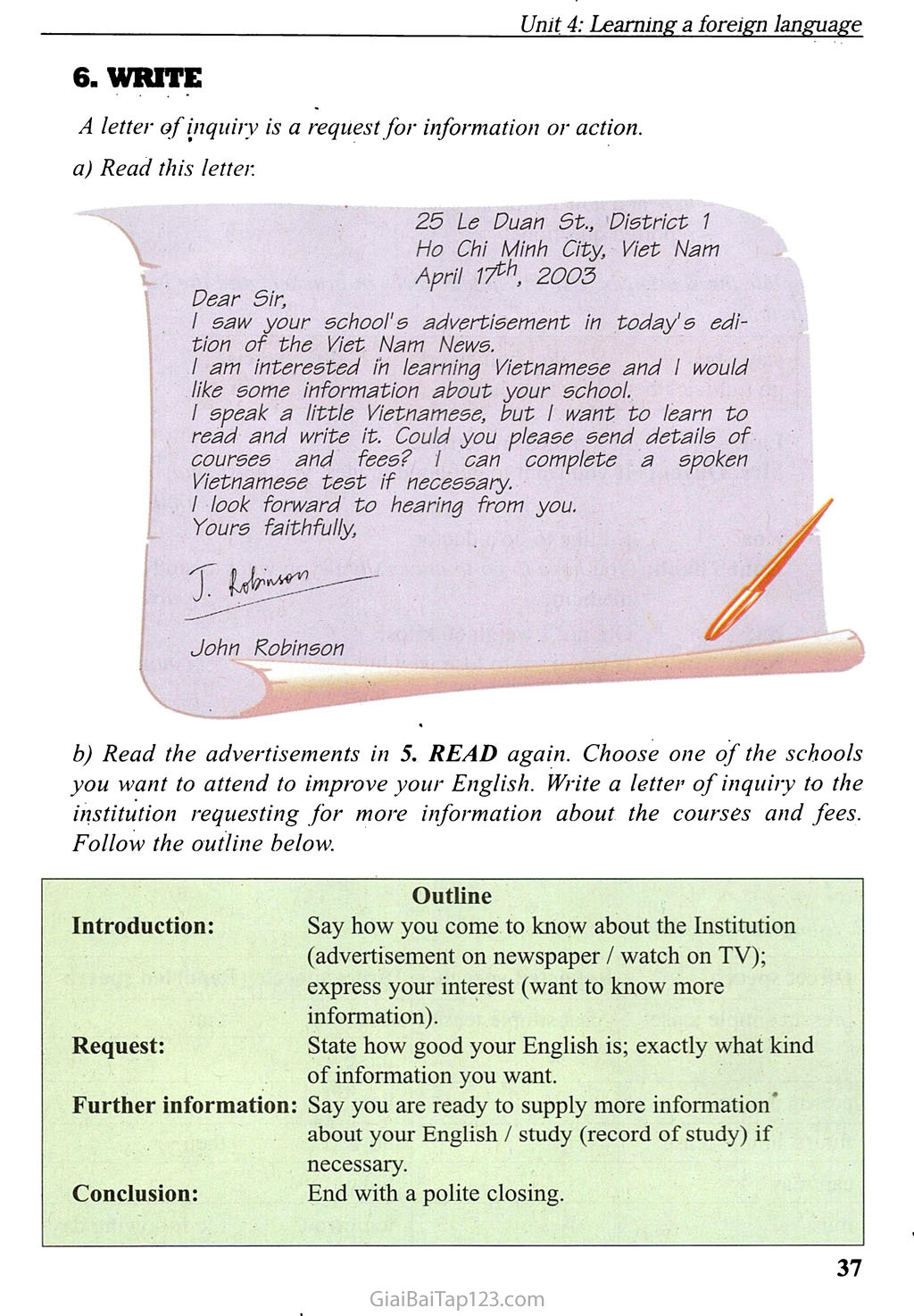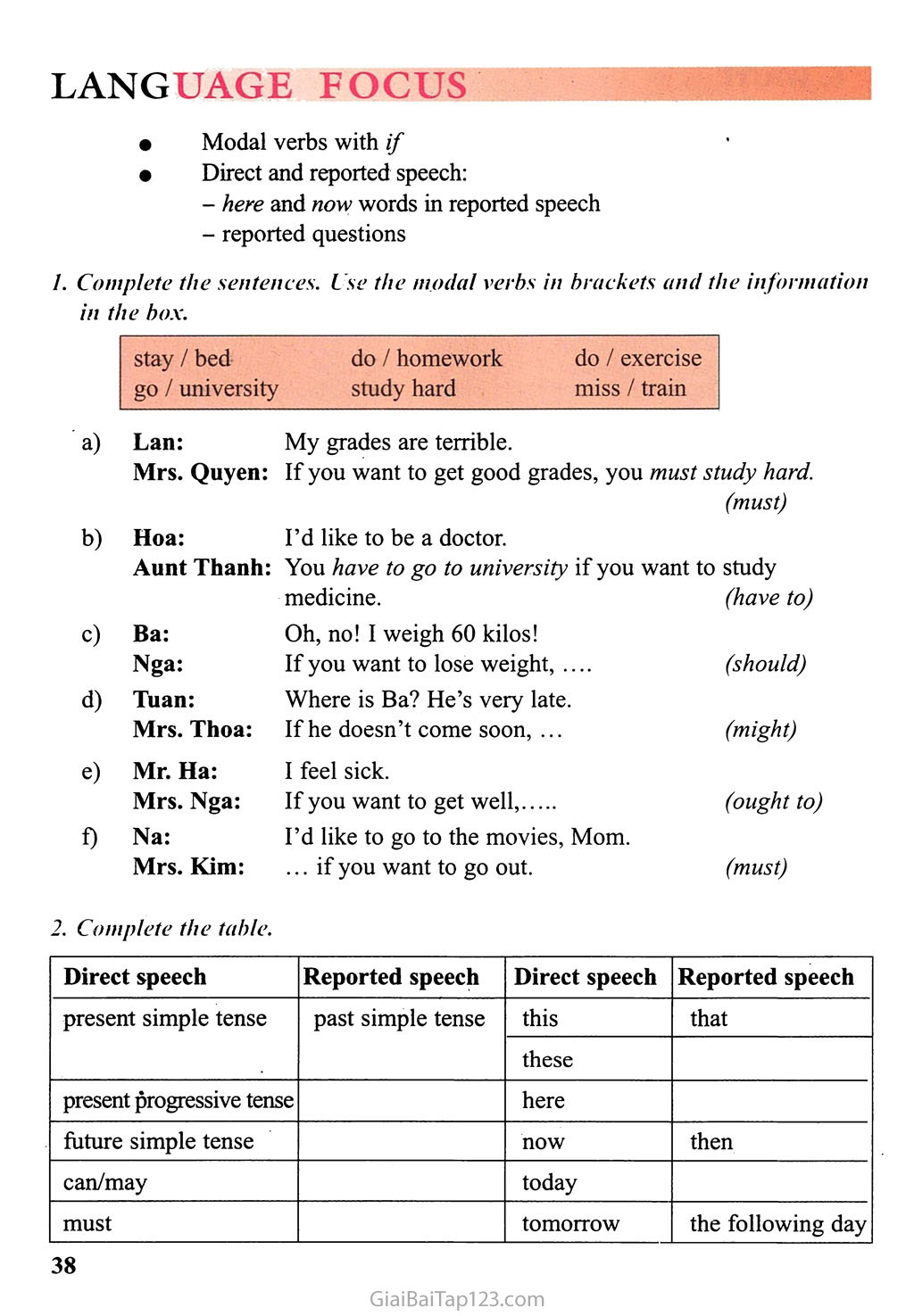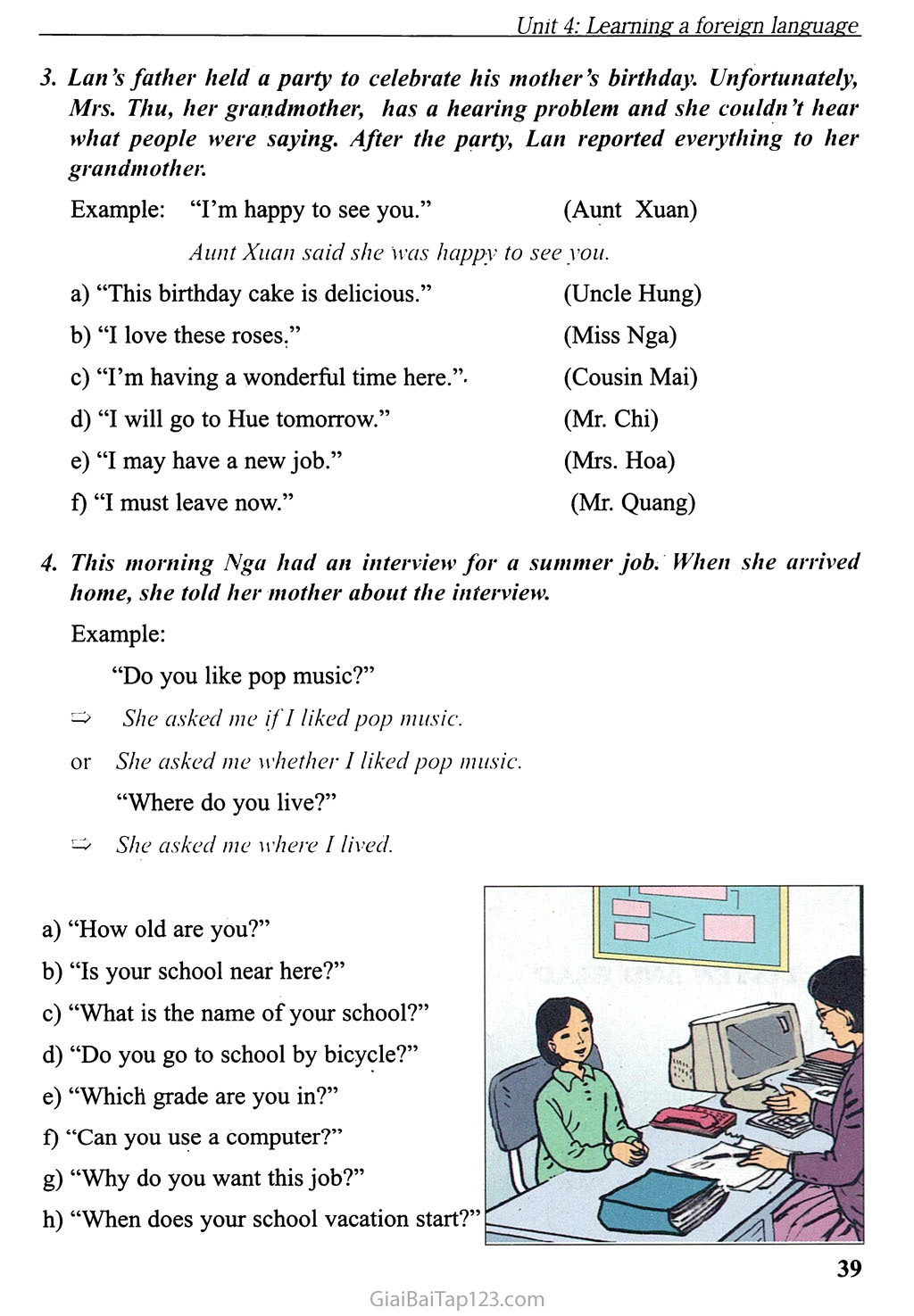SGK Tiếng Anh 9 - Unit 4: Learning a foreign language
UNIT 4 LEARNING A FOREIGN LANGUAGE 1. GETTING STARTED How do you learn English? Check (V) things you do from the list. Add more things you do or you want to do. Then work with a partner and compare your list. ■ ... Do the homework. Do more grammar exercises in grammar books. Read short stories or newspapers in English. Write English as much as possible. Learn by heart all the new words and texts. Speak English with friends. Use a dictionary for reading. Practice listening to English tapes or English programs on the radio. Watch English TV programs. Learn to sing English songs. H 2. LISTEN AND READ Paola: Hey, Lan! Have you finished your exam? Lan: Yes ... , I have. Paola: Were the questions difficult? Lan: Well, they were quite hard. Paola: Did you pass? Lan: I’m not sure. The examiner didn’t tell me. Paola: What questions did she ask you? Lan: First she asked me what my name was, and where I came from. Paola: They were easy for you, weren’t they? Lan: ... Then she asked me why I was learning English, ... and if I spoke any other languages. Paola: Go on. Lan: ... Then she asked me how I learned English in my country. ... And she asked how I would use English in the future. Paola: What else did she ask you? Lan: Oh, Paola! Let me try to remember! ... Ah, she asked me what aspect of learning English I found most difficult. Paola: Is that all, Lan? Lan: Oh. There were a lot of other questions. She also asked me to read a passage. Paola: What did she say in the end? Lan: I’m trying to remember... Oh, yes! Exactly she said “If you want to attend the course, you must pass the written examination. Good luck!” Paola: It’s terrible, Lan. I don’t think I will be able to pass the exams. Lan: Don’t worry, Paola. Everything will be all right. Practice the dialogue with a partner. Answer. What exactly did the examiner ask Lan? Look at the list of questions and check (S) the boxes. ROYAL ENGLISH COLLEGE Examination in English as a foreign language Stage One: Oral Examination (This list must not be shown to the candidates.) What is your name? Where do you come from? Where do you live? Do you live with your parents? When did you begin studying English? Why are you learning English? Do you speak any other languages? How did you learn English in your country? How will you use English in the future? What aspect of learning English do you find most difficult? What are you going to learn? What are your hobbies? Look at this picture. Describe it. Read this passage. Example: SPEAK Work in groups. You are Thu, Tam and Kim, and you are awarded a scholarship of US$2,000 to attend an English language summer course abroad. Try to persuade your partner to attend the school you would like to go to. The expressions in the box may help you. I think.... What do you think ...? I agree/ disagree because .... I don’t understand. Why don’t we ...? If we go to ..., we can... . We should .... Let’s .... Thu Tam Kim The Brighton Language Center-UK live in a dormitory on campus school has excellent reputation six weeks Seattle School of English -USA stay with Vietnamese friends experience Western culture seven weeks Brisbane Institute of English - Australia stay with an Australian family quite close to Viet Nam beautiful scenery seven weeks approximately US$2,000 approximately US$1,700 approximately US$1,200 think we should go to the Seattle School of English in the USA. You can stay with Vietnamese friends. I disagree because we can't practice speaking English with native speakers. Why don't we go to the Brighton Language Center in the United kingdom? If we go there, we can live in a dormitory on campus. H 4. LISTEN Nga is talking to Kate about her studying English. Listen to their conversation. Check)(7) the boxes and correct the false sentences. Nga’s studying English for her work. She learned English at school and university. She works for a national bank in Ha Noi. She needs to improve her writing. Her listening is excellent. True False 0 □ □ □ □ □ □ □ □ □ □ □ f) She hopes she can talk to people from all over the world, and understand her favorite English songs. ổ/í »7°i*£^GUAGE ĩĩ°Ề^.^rchi"^ Cmrsss Novemtvr 5. READ -K —V — V -*• —A -K JT I Notes £nglLảh CỈÍL&Â evUilụ evening inieAmevLiaie ỉeveỉ ALaAỈing Laie 0civ beA / eaAig TlvvembeA ——7L sgSi'x those °see US at the New Come and see u Academy of Language in Why not learn to speak a foreign language with others? We have well-qualified teachers Classes in the morning, afternoon and evening Courses begin first week of November Phone 8278787 for more information TZfj a) Note down information about the English classes from the advertisements. School Class time (morning/afternoon/ evening...) Language Level (begin- ner/intermediate/ advanced) Time to start Academy of Language Foreign Language Council New English Institute Read the notes Mr. Lam made. Then look at the advertisements and choose t suitable language school for him. Give reasons for your choice. 6. WRITE A letter of inquiry is a request for information or action, a) Read this letter. 25 Le Duan St., District I Ho Chi Minh City, Viet Nam April 17th, 2005 Dear Sir, I saw your school's advertisement In today's edi tion of the Viet Nam News. I am Interested in learning Vietnamese and I would like some information about your school. I speak a little Vietnamese, but I want to learn to read and write it. Could you please send details of courses and fees'? I can complete a spoken Vietnamese test if necessary. I look forward to hearing from you. Yours faithfully, John Robinson b) Read the advertisements in 5. READ again. Choose one of the schools you want to attend to improve your English. Write a letter of inquiry to the institution requesting for more information about the courses and fees. Follow the outline below. Outline Introduction: Say how you come to know about the Institution (advertisement on newspaper / watch on TV); express your interest (want to know more information). Request: State how good your English is; exactly what kind of information you want. Further information: Say you are ready to supply more information about your English / study (record of study) if necessary. Conclusion: End with a polite closing. LANGUAGE FOCUS Modal verbs with if Direct and reported speech: here and now words in reported speech reported questions Complete the sentences. Use the modal verbs in brackets and the information in the box. stay / bed go / university do / homework do / exercise study hard miss / train a) Lan: My grades are terrible. Mrs. Quyen: If you want to get good grades, you must study hard. (must) b) Hoa: I’d like to be a doctor. Aunt Thanh: You have to go to university if you want to study medicine. (have to) c) Ba: Oh, no! I weigh 60 kilos! Nga: If you want to lose weight, .... (should) d) Tuan: Where is Ba? He’s very late. Mrs. Thoa: If he doesn’t come soon, ... (might) e) Mr. Ha: I feel sick. Mrs. Nga: If you want to get well, (ought to) f) Na: I’d like to go to the movies, Mom. Mrs. Kim: ... if you want to go out. (must) 2. Complete the table. Direct speech Reported speech Direct speech Reported speech present simple tense past simple tense this that these present progressive tense here future simple tense now then can/may today must tomorrow the following day Lan’s father held a party to celebrate his mother’s birthday. Unfortunately, Mrs. Thu, her grandmother, has a hearing problem and she couldn’t hear what people were saying. After the party, Lan reported everything to her grandmother. Example: “I’m happy to see you.” (Aunt Xuan) Aunt Xuan said she was happy to see you. (Uncle Hung) (Miss Nga) (Cousin Mai) (Mr. Chi) (Mrs. Hoa) (Mr. Quang) “This birthday cake is delicious.” “I love these roses.” “I’m having a wonderful time here.”. “I will go to Hue tomorrow.” “I may have a new job.” “I must leave now.” This morning Nga had an interview for a summer job. When she arrived home, she told her mother about the interview. Example: “Do you like pop music?” She asked me if I liked pop music. or She asked me whether 1 liked pop music. “Where do you live?” She asked me where I lived. “How old are you?” “Is your school near here?” “What is the name of your school?” “Do you go to school by bicycle?” “Which grade are you in?” “Can you use a computer?” “Why do you want this job?” “When does your school vacation start?'

